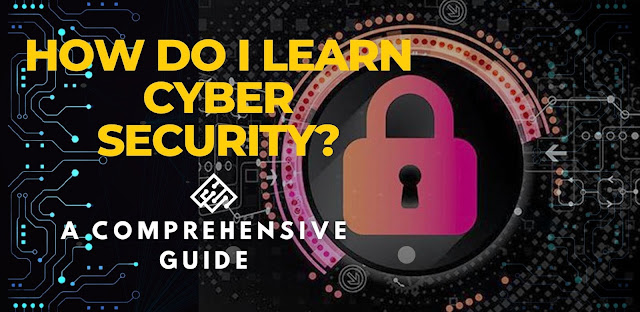Hello, and thank you for visiting our extensive tutorial on
learning about cyber-security. In this piece, we will go deep into the area of
cyber security and provide you with the information, tools, and resources that
you need to have a successful journey in this subject that is always growing.
Acquiring Knowledge on Cyber Security
The process of securing computer systems, networks, and data
against digital assaults and illegal access is referred to as cyber security.
In our modern, technologically-driven society, it has rapidly evolved into one
of the most important areas. The significance of ensuring that our digital
infrastructure is secure only grows as our society becomes more dependent on
it.
Why is it Important to Have Cybersecurity?
It is impossible to exaggerate how important it is to have
secure systems online. As a result of the proliferation of cybercrime and data
breaches, both organizations and people are always at danger of being subjected
to nefarious assaults. Cyber threats have the potential to interfere with
operations, put confidential information at risk, and result in major financial
losses.
The Current State of the Cybersecurity Landscape
It is vital, prior to delving into the area of cyber
security, to have a solid understanding of the many subfields and subfields
that comprise this discipline. The following are some important aspects of
cyber security:
Network security is the practice of protecting computer
networks against unwanted access, threats, and vulnerabilities. The protection of computer networks is the primary emphasis of network security.
Concerned with the protection of sensitive data and assuring
its confidentiality, integrity, and availability. Also known as
"information security."
Application security refers to the process of protecting
software programs against flaws and dangers that may exist inside the
application.
Cloud security addresses the concerns of the safety of data
that is kept in the cloud as well as cloud computing in general.
Ethical Hacking: Also known as penetration testing, ethical
hacking involves simulating cyber assaults in order to locate weaknesses inside
computer systems and computer networks.
The process of researching and analyzing digital data in
order to react to and recover from cyber events is referred to as digital
forensics.
How Should One Begin Their Career in Cybersecurity?
To get started in the field of cyber security, you need
determination, a commitment to lifelong learning, and practical experience. To
get you started on your trip, these are the actions you should take:
1. The Building Blocks of Education
To get started, construct a solid educational foundation in the fields of information technology and computer science. Consider earning a degree in computer science, network security, or cyber security by taking classes in one of these areas.
2. Training and Accreditation Via the Internet
Online courses and certificates may supplement the knowledge you get in a traditional setting. Coursera, Udemy, and Pluralsight are just a few of the many recognized online education communities that provide training in the field of cyber security. These classes go through a broad variety of subjects, ranging from fundamentals of computer security to more sophisticated methods of ethical hacking.
3. Training with the Hands
In the field of cyber security, theory on its own is insufficient. Participate in practical activities that will help you solidify what you've learned. Create your own personal virtual lab environment, try out a variety of tools, and get some experience locating and repairing security flaws.
4. Competitions Known as "Capture the Flag" (CTF)
Take part in "Capture the Flag" (CTF) tournaments, which are cybersecurity challenges that give you the opportunity to solve difficulties and riddles that are based in the real world. The use of your abilities in a competitive setting may be made more enjoyable and engaging via the participation in CTFs.
5. Engaging in Community Activities and Networking
Join cyber security discussion groups, participate in online communities, and go to conferences or meetings to make connections with other experts in the field. Participating actively in the community may assist you in being current with the most recent developments in cyber security including trends, technologies, and practices.
6. Opportunities for entry-level work and internships
Seek for entry-level work or internships in the field of cyber security. Your education and professional development will benefit tremendously from time spent gaining experience working in a real-world situation.
Topics of Advanced Concern in Cybersecurity
As you move through your path in cyber security, you should
consider delving into more sophisticated areas so that you may improve your
level of competence. Here are few instances that illustrate this point:
1. An Examination of Malware
Master the process of disassembling and analyzing malware in order to comprehend its operation and devise solutions to effectively combat it.
2. Reverse Engineering
Enter the fascinating realm of reverse engineering to investigate and learn about the inner workings of different software and systems.
3. In search of Danger
Acquire the skills necessary to aggressively seek for and recognize potential cybersecurity risks before they might cause damage.
4. The Safety of Cryptocurrencies
Gain an understanding of the one-of-a-kind security concerns posed by cryptocurrencies and the technology behind blockchains.
5. Mobile Security
Investigate the safety features of mobile devices and apps, since they are quickly becoming the most common targets of cyber assaults.
The Resources Necessary for Ongoing Education
Because cyber security is a sector that is always shifting
and developing, it is essential to keep abreast of the most recent tendencies
and breakthroughs. The following are some helpful resources that may support
ongoing education:
1. Online diaries and news aggregators
Keep up with reliable cyber security news sources and blogs to get up-to-date information on the most recent threats, vulnerabilities, and recommended procedures.
2. Seminars and Workshops Conducted Via the Internet
Participating in webinars and seminars offered by industry professionals is a great way to get both theoretical understanding and hands-on experience.
3. Written works and printed materials
Read books and other materials written by well-known specialists in the field of cyber security. In-depth analysis and case studies may often be found within these sites.
4. Professional Accreditations and Qualifications
If you want to increase both your reputation and your level of knowledge, you might think about getting advanced certifications like Certified Information Systems Security Professional (CISSP) or Certified Ethical Hacker (CEH).
Closing Remarks
Learning about cyber security may be a fascinating and
gratifying adventure, but it does take a commitment to ongoing study and a
voracious appetite for information. You may have a prosperous career in the
area of cyber security if you follow the steps that are mentioned in this
tutorial and if you remain dedicated to your own personal education.
It is important to keep in mind that cyber security is not only a job; rather, it is a duty to safeguard people, companies, and society from the persistent cyber dangers.



.jpg)


0 Comments